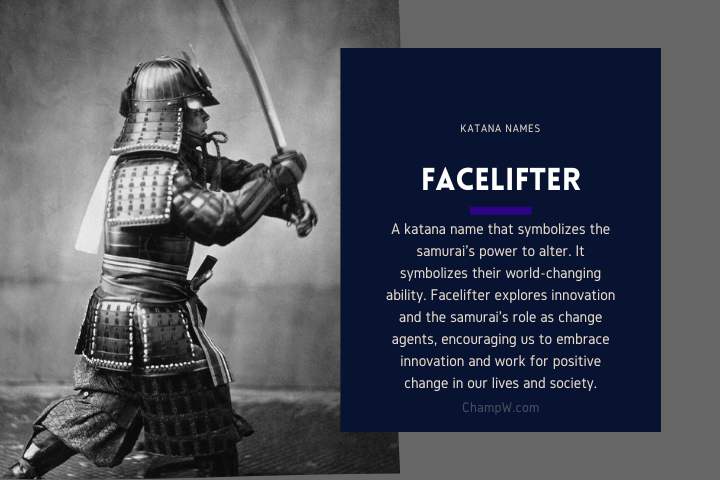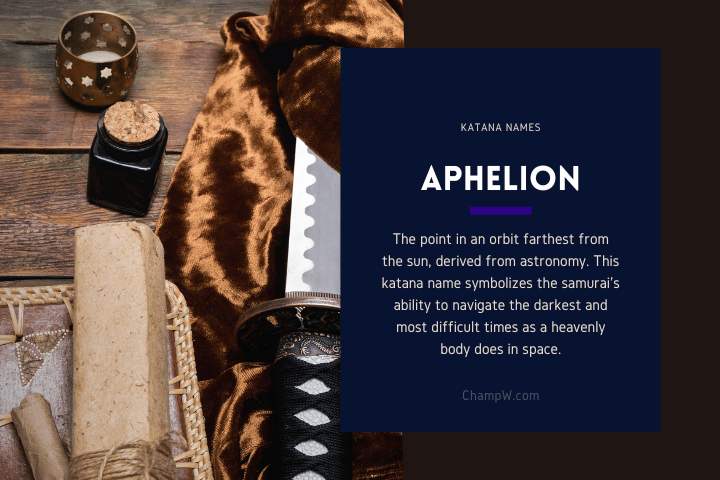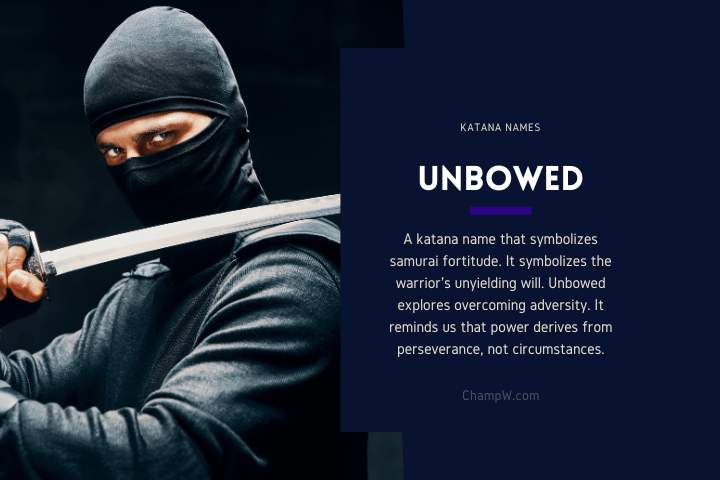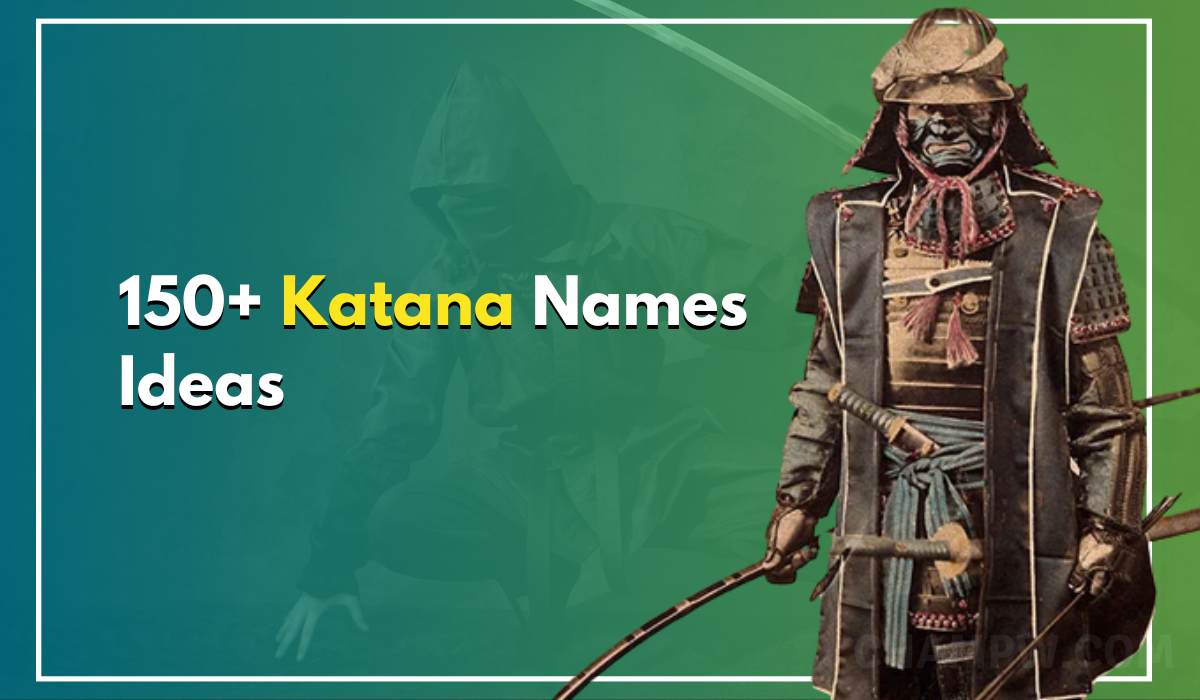Katana Names can provide insights into its unique qualities and serve as a symbol of honour and respect.
Many people may not be aware, but katanas, the iconic Japanese swords, often possess names that hold deep meaning and significance.
These names are not merely random choices but are carefully chosen to reflect the sword’s craftsmanship, history, or even the personality of its owner.
Famous Katana Names
This blog explores katana names’ philosophical origins and significance. Join us as we discover the history behind these famous names and learn more about Katana’s fascinating heritage.
- Fleshrender: This katana name symbolizes combat and violence.
- Gong Bu: A katana name that evokes discipline and mastery.
- Tetsuyama: Tetsuyama evokes old conflicts and the tenacious spirit of samurai warriors.
- Ontology’s End: The name fits the warriors who wielded it: mysterious and enigmatic.
- Shinogi: Shinogi symbolizes the katana blade’s superb balance of strength and precision.
- Shino Tsume: “Shino” means “sunlight filtering through tree branches,” while “Tsume” means “claws.” This term symbolizes the samurai’s agility and predatory strikes.
- Mihai: This katana’s name, derived from the archangel Michael, symbolizes divine protection and direction that enhances its wielder’s battlefield skills.
- Yorukaze: It reminds us that even in stillness, change and action are possible.
- Darkheart: Darkheart symbolizes the samurai warrior’s dualism.
- Katen Kyokotsu: Mysterious katana name. The folklore of Katen, a gorgeous seductress with seductive powers, and Kyokotsu, a skeletal beast with an insatiable soul hunger, inspired it.
- Ryuusei no Ikari: “Fury of the Shooting Star,” embodies the explosive strength and speed of a meteor.
- Bushikatagi: “Warrior’s Spirit”: delves into the samurai spirit. Samurai commitment to their ruler, country, and code of honor is symbolized by this katana name.

Japanese Katana names
Sword fans have revered the Japanese katana for generations due to its precision and craftsmanship. These swords are beautiful and have unique names, representing Japan’s rich cultural heritage.
- Inazuma: This katana’s name evokes a thunderstorm’s lightning-fast strikes, highlighting its lightning-fast triumph.
- Oblivion’s Call: It symbolizes a warrior’s acknowledgement of life’s impermanence and urges them to fight honourably even in the face of death.
- Nozarashi: A great samurai recognized for their war prowess and loyalty once owned Nozarashi.
- Kazanami: The volcano’s fiery essence. It comes from the Japanese words “Kaza,” “volcano,” “nami,” and “wave.”
- Himetsuruichi: Himetsuruichi means elegance, refinement, and tradition.
- Aphelion: The point in an orbit farthest from the sun, derived from astronomy.
- Reflecting Pool: The term reflects the samurai’s self-improvement and introspection.
- Futsunomitama-no-Tsurugi: Futsunomitama-no-Tsurugi implies ancient deity and supernatural power.
- Sen no Taiyou no Tsurugi: “Sword of a Thousand Suns,” Sen no Taiyou no Tsurugi symbolizes the samurai’s capacity to illuminate and warm the darkest places.
- Ama-no-Habakiri: Japanese mythology reveres Ama-no-Habakiri. It represents the samurai’s indomitable spirit and ability to cut through heaven.
- Galatine: Sir Gawain’s name comes from Arthurian legend.
- Suzaku: Japanese folklore and legend revere Suzaku, the Vermilion Bird. Rebirth and renewal are symbolized by this katana name.
- Zabimaru: From the Japanese words “zabu,” meaning serpent, and “maru,” meaning round, Zabimaru symbolizes the samurai’s raw might and instinct.
Cool Katana names
Cool katana names range from traditional Japanese names to pop culture-inspired names for aficionados who want to give their valued belongings a unique personality.
- Bushikatagi: This katana name emphasizes technique and talent, reminding samurai that genuine mastery requires both physical strength elegance, and precision.
- Chi Xia: “Crimson Dawn,” Samurai Chi Xia represents their ferocity. This katana name symbolizes the samurai’s unwavering dedication and sacrifice for justice.
- Parallel Convergence: Samurai may combine their physical and mental strengths into a harmonious totality.
- Fleshrender: A samurai’s raw force and killing intent, Fleshrender terrifies opponents.
- Ashisogi Jizo: The Japanese deity of children and travellers symbolizes the samurai’s compassion and obligation to protect the weak.
- Nozarashi: “Weather Beater,” Nozarashi symbolizes the samurai’s tenacity.
- Cheng Ying: Chinese mythology’s Cheng Ying represents the samurai’s relationship to nature and the elements.
- Nodachi: known as the “Field Sword” or “The Emperor of Swords,” the Nodachi katana depicts the samurai’s battlefield leadership.
- Moonshadow: A mysterious katana name. Like a moonlit shadow, it symbolizes the samurai’s stealth and accuracy.
- Shinigami: meaning “Death God,” is a katana name that explores the samurai’s darker side. It reminds them of their power to kill and destroy opponents.
- Kensei: “Sword Saint,” Kensei represents the samurai’s quest for swordsmanship perfection.
- Yanagi no Sakura: “Willow Blossom,” is a Japanese symbol.
- Aburame Sukehiro: This katana honours the insect-loving Aburame clan. “Sukehiro” combines the Japanese terms “suke” for “help” and “Hiro” for “large.”
- Tsubame Gaeshi: Sasaki Kojirou’s famed swordsmanship technique. This katana name evokes fast, precise motions like a swallow’s flight.
Names for Katanas from mythology
Explore the mystical realm of names for Katanas from mythology and uncover the extraordinary tales behind these legendary blades.
- Kamigoroshi: “god slayer,” symbolizes the continuous struggle between mortals and the gods.
- Satsujinki: A katana name that frightens foes. Its translation, “killer of a hundred,” symbolizes the unrelenting quest for fighting skill.
- Kokoro no Tamashii: literally “soul of the heart,” explores the samurai’s spiritual and emotional life.
- Amaterasu: The Japanese sun goddess has deep cultural and legendary connotations. Sunlight and life are symbolized by this katana name.
- Ghostblade: A mysterious katana name. The samurai’s ability to go unseen and strike with lethal accuracy resembles a battlefield ghost.
- Unbowed: A katana name that symbolizes samurai fortitude. It symbolizes the warrior’s unyielding will.
- Aimi: Love and compassion in katana form. It examines the samurai’s compassion in war.
- Shisui: A katana name meaning clarity and focus. It symbolizes the samurai’s capacity to see through deception and focus on the present.
- Sarolta: A katana name honouring women fighters’ strong strength and unwavering tenacity.
- Norzarashi: A purification and inner harmony katana name.
- Hope’s Echo: A katana name that symbolizes optimism and tenacity in the midst of despair.
- Ikazuchi: The katana name evokes the samurai’s thunderous attacks.
- Caliburn: Arthurian legend’s sword, Caliburn, is a katana name.
- Heartseeker: Samurai katanas are named for their ability to strike at their opponents’ weaknesses.
- Facelifter: This katana moniker symbolizes the samurai’s combat transformation. They may change history with it. Facelifter examines power and responsibility.
- Infinity Edge: A katana name that explores the samurai’s limitless potential.
- Hebi Doku: This katana name explores the samurai’s darkest side. It symbolizes their poisonous blows and the brutality and cunning needed to survive in war.
- Spitehawk: Samurai’s vengeful and driven katana name. It symbolizes their unrelenting pursuit of retribution against wrongdoers.
- Kurou no Tatsu: A katana name that symbolizes the samurai’s tenacity. It symbolizes their indomitable will to overcome misfortune.

Cursed Katana names
Explore the forbidden lore of cursed katana names. Delve into the captivating histories and haunting mysteries that surround these legendary blades.
- Deathrazer: A katana name that explores the samurai’s mortality. They embrace life’s impermanence and death.
- Fresshta: Samurai’s katana name, representing purity and righteousness. It represents their steadfastness and virtue.
- Nadia: Samurai grace and elegance in a katana name. It symbolizes their mastery of physical and spiritual conflict, blending strength with beauty.
- Balisarda: Ancient mythology inspired the katana name Balisarda. It symbolizes the samurai’s heritage and lineage.
- Spiritfarer: A katana name that honours samurai as warriors and protectors.
- Kin no tora: A katana name that symbolizes samurai loyalty and dedication. It symbolizes their intense loyalty and willingness to die for their lord.
- Bloodthirster: A katana name that evokes samurai fighting ferocity. It symbolizes their ruthless quest for victory at the expense of their own well-being.
- Akaiittou: Akatana moniker that signifies samurai’s undying allegiance to their allies. It symbolizes their trust in each other on and off the battlefield.
- Takame: Takame represents the samurai’s continual pursuit of self-improvement. It shows their dedication to improving and surpassing their previous accomplishments.
- Ninja no Kage: Samurai’s complicated relationship with ninjas is explored in this katana name.
- Tranquillity: A katana name that symbolizes the samurai’s tranquillity in chaos. Despite fighting, it symbolizes their inner tranquillity.
- Jalarth: Jalarth represents the samurai’s affinity to nature. It symbolizes their respect for nature and awareness of life and death.
- Hallowed Reckoning: A katana name about samurai spirituality and enlightenment. It symbolizes their mortality and final judgment.
- Tahir: A katana name that symbolizes the samurai’s unshakable honour and integrity. It symbolizes their dedication to morality.
- Stormrazor: Samurai can use nature’s strength to strike. It symbolizes their control over wind, rain, and lightning.
- Wabisuke: The katana name emphasizes the samurai’s love of simplicity and imperfection.
- Ryuusei no Ikari: This katana name expresses the samurai’s ferocious tenacity and unyielding resolve.
- Fateh: A katana name that symbolizes the samurai’s faith in destiny and acceptance of their fate.
- Kissaki-Moroha: The dual-edged blade symbolizes the samurai’s adaptability.
Good Names for Katanas
In this essay, we’ll explore the mysterious realm of good katana names, from vengeful to enigmatic.
- Euology: Euology tackles mortality and the samurai’s meditation on their legacy, encouraging us to make the most of our time and make a difference.
- Chun Jun: A katana name that symbolizes the samurai’s steadfast devotion to their Lord. It symbolizes their service and sacrifice for their feudal lord.
- Univocal: Samurai’s unflinching intent and katana name. It symbolizes their determination to succeed.
- Requiem: A katana name that explores the samurai’s thoughts on death and life’s transience. They accept mortality and the cycle of life and death.
- Gan Jiang/Mo Ye: katana names representing the samurai’s yin and yang. Gan Jiang represents strength and desire, whereas Mo Ye represents balance and calm.
- Zabimaru: Samurai katana names reflect their ferocity and commitment in battle. It symbolizes their tenacity and willingness to face any challenge.
- Shichishito: A katana name that symbolizes the samurai’s commitment to justice and protecting the defenceless.
- Wakizashi: Samurai katana names reflect their honour and responsibility.
- Nazak: A katana name that reflects the samurai’s grace and elegance in combat and life.
- Blossom: Samurai recognize life’s transient beauty with this katana name. It symbolizes their acceptance of the present and appreciation of life’s transience.
- Makaze: A katana name representing the samurai’s connection to change. It shows their ability to change with life.
- Hylozoist Promise: The katana moniker represents the samurai’s regard for all life. It symbolizes their dedication to life preservation everywhere.
- Tenken: A katana name that symbolizes samurai allegiance to their lord.
- Oath Keeper: Samurai swear to defend their motherland with this katana name. It symbolizes their patriotism and sacrifice.
- Usumidori: The katana name represents the samurai’s goal of martial arts mastery. It symbolizes their dedication to mastering their craft.
- Ikazuchi: A katana name that signifies the samurai’s link to the divine and belief in a higher force. It symbolizes their faith in nature.
- Amagumo: This katana name symbolizes the samurai’s capacity to find calm in the chaos. It symbolizes their composure in turbulent times.
- Shisui: Samurai wisdom and vision are symbolized by this katana name. It shows their intelligence and decision-making skills.
- Kage Kaizoku: This katana name represents the samurai’s ability to blend in and strike precisely. It symbolizes their sneakiness.
- Heaven’s Envoy: The katana name represents the samurai’s trust in divine intervention. It symbolizes their confidence in a higher power to lead them.
- Yameri Renai Chikara: a katana name that symbolizes the samurai’s indomitable spirit. It symbolizes their perseverance.
Heroic Katana names
These names are meaningful and capture their wielders’ bravery. In this post, we’ll examine heroic Katana names and how they’ve shaped Japan’s noble warrior culture.
- Stormcaller: Samurai can channel nature’s power with this katana name. It symbolizes their connection to nature and storm control.
- Kumorigachi: The katana moniker of the samurai’s stealth and deception.
- Darkheart: A katana moniker that represents the samurai’s struggle with darkness and ability to face their shadows.
- Rigor Mortis: A katana name that symbolizes the samurai’s self-discipline.
- Ashrune: Akatana name that symbolizes the samurai’s ability to rise from the ashes and rebuild stronger. It shows their resiliency.
- Gan Jiang: A katana name that symbolizes the samurai’s pursuit of excellence. It symbolizes their passion to create masterpieces.
- Desolation Slicer: The katana name represents the samurai’s destructive strength on the battlefield.
- Eien no ikari: The katana name symbolizes the samurai’s unending anger and tireless pursuit of justice.
- Izanagi Asi: A katana name that signifies the samurai’s connection to the gods and capacity to channel divine energy.
- Sarolta: A katana name that symbolizes samurai loyalty to family. It shows their dedication to family.
- Nomad’s Knife: A katana name that emphasizes the samurai’s adaptability. I
- Makaze: A katana name that symbolizes the samurai’s fast and decisive battle actions. They’re agile and quick-thinking.
- Ontology’s End: The katana name represents the samurai’s search for truth and understanding. It symbolizes their intellectualism.
- Oculus Edge: A katana moniker that symbolizes the samurai’s sharp perception and ability to see beyond the surface.
- Kusanagi-no-Tsurugi is a katana name representing the samurai’s relationship to nature and the elements. It symbolizes their capacity to control nature.
- Darkest Desire: It symbolizes their conflict between duty and pleasure.
- Kumorigachi: Kumorigachi explores resilience and the samurai’s steadfast endurance, encouraging us to keep going despite challenges.
- Mugenjin: Mugenjin encourages self-improvement by examining the samurai’s dedication to change.
- Shinogi: It symbolizes their emotional control and composure in any situation.
- Blutgang: A katana name symbolizing the samurai’s unwavering commitment to their feudal lord. It symbolizes their loyalty.
- Ashrune: Ashrune explores the samurai’s contemplation on mortality and encourages us to live each day to the fullest and value life.
- Excalibur: The samurai’s katana name represents respect and dignity.
- Dragon’s Ire: It symbolizes their determination. Dragon’s Ire inspires us to persist through adversity by examining the samurai’s tenacity.
- Harmony’s Edge: Harmony’s Edge explores inner serenity and the samurai’s awareness and self-reflection, encouraging us to develop peace within and harmony with others.

Legendary Katana names
This article explores magnificent katana names with centuries-old tales of bravery, loyalty, and artistic mastery.
- Seishin no Inori: The katana name symbolizes the samurai’s spirituality and respect for nature.
- Ryūgū: The samurai’s graceful and elegant katana name. It shows their advanced skills and art taste.
- Malice: The katana name Malice represents the samurai’s evil aspect.
- Kyoka Suigetsu: Kyoka Suigetsu explores deception and the samurai’s skill to outwit their opponents, reminding us of our own illusions and facades.
- Aimi: Samurai’s compassionate katana name. It shows their empathy.
- Hebi Doku: Hebi Doku explores secrecy and the samurai’s function as clandestine operatives, warning us against deception and manipulation.
- Kimi: Kimi addresses history and the samurai’s duty to uphold their lineage’s values, encouraging us to cherish and protect our own cultural heritage.
- Caladgolg: A katana name that symbolizes the samurai’s invincible resolve and energy.
- Galatine: A katana name that symbolizes samurai recklessness and risk-taking.
- Kissaki-Moroha: Tsubaki: It symbolizes their ability to adapt to adversities without breaking.
- Tora Kiba: Tora Kiba encourages us to find our inner power and reach our potential by exploring the samurai’s unshakeable commitment.
- Shed Restraint: A katana term that symbolizes the samurai’s ability to shed attachments and emotions.
- Kissaki-Moroha: Samurai’s blend of kindness and might. They can be fierce warriors and kind people.
- Justifier: A katana name that represents the samurai’s pursuit of justice. Their morality is unshakeable.
- Shichishito: A katana name that symbolizes the samurai’s spirituality.
- Zangetsu: The samurai understood life’s transience. Zangetsu explores impermanence and the samurai’s acceptance of change, telling us to embrace life’s passing moments and cherish its beauty.
- Kage Kaizoku: Symbolizes stealth and cunning. It symbolizes their stealth and precision.
- Zantetsuken: a katana name representing the samurai’s swordsmanship and power to cut through anything. Their precision is unmatched.
- Facelifter: A katana name that symbolizes samurai adaptability. It symbolizes their adaptability.
- Hadar: It symbolizes their conservation and peace with nature.
- Benihime: It symbolizes their elegance. Benihime encourages us to appreciate the beauty and the samurai’s aesthetics.
- Ash: a katana name representing the samurai’s link to life and death. They accept death and find beauty in decay.
- Wakizashi: Wakizashi is a katana name representing samurai loyalty and dedication.
- Kubikiri Orochi: a katana name symbolizing the samurai’s ability to break connections and move on. It symbolizes their ability to progress and start over.
- Lifedrinker is a katana name that symbolizes samurai tenacity. It symbolizes their tenacity to succeed.
- Facelifter: a katana moniker that symbolizes the samurai’s power to alter. It symbolizes their world-changing ability.
- Ama-no-Ohibari: is a katana name that symbolizes the samurai’s divine link. It symbolizes spiritual enlightenment and access to higher realms.
- Makaze: Makaze explores flexibility and the samurai’s ability to adapt, encouraging us to be flexible and open-minded.
- Hellscream: a katana name evoking samurai wrath and fortitude. It symbolizes their indomitable spirit.
FAQs
1. What are some popular Japanese katana names?
Some popular Japanese katana names include Tatsu no Otoko (Dragon Man), Kiba no Kagami (Fang Mirror), and Hagane no Tsuki (Steel Moon).
2. Can I create my own unique katana name?
Absolutely! Creating your own unique katana name adds a personal touch to your weapon and can reflect your personality or purpose for owning it.
3. Are there any traditional rules or guidelines for naming a katana?
While there are no strict rules, tradition suggests using kanji characters and avoiding negative connotations. It’s also common to choose words that represent strength, honour, or bravery.
4. How do I come up with a fitting name for my katana?
Consider the qualities you want your katana to embody, such as power, elegance, or resilience. Researching Japanese mythology, nature, or historical figures can inspire meaningful names.
5. Can I use English words for a katana name?
Yes! Many people choose to incorporate English words into their katana names to add an international flair or align with their own cultural background.
6. Are there any famous historical katana names I can draw inspiration from?
Certainly! Famous historical katana names include Kogarasu Maru (Little Crow) and Onimaru (Demon Slayer). These legendary swords have rich stories attached to them.
7. Should I consult a native Japanese speaker when choosing a katana name?
While not required, consulting a native Japanese speaker can provide valuable insights and ensure accurate translation if you decide to use kanji characters in your sword’s name.
8. Can I change the name of my katana after it has already been named?
Yes, you can change the name of your katana at any time if you feel like it no longer reflects the spirit of the sword or if you simply want a fresh start.
Also Read:
- 200+ Samurai Nicknames Ideas For Strong Warriors Only
- 150+ Popular Names For A Sword: Fantasy and Historical
- 100+ Crazy Greninja Nicknames That Are Popular
Final Words
The names of katana swords serve as more than mere identifiers; they offer insights into the rich tapestry of Japanese history, culture, and symbolism.
Through their connection to nature, representation of historical events, embodiment of virtues, and the sacred act of naming itself, these names provide a deeper understanding of the esteemed katana’s heritage. Each name holds a story waiting to be uncovered, adding a layer of intrigue and reverence to these legendary weapons.
